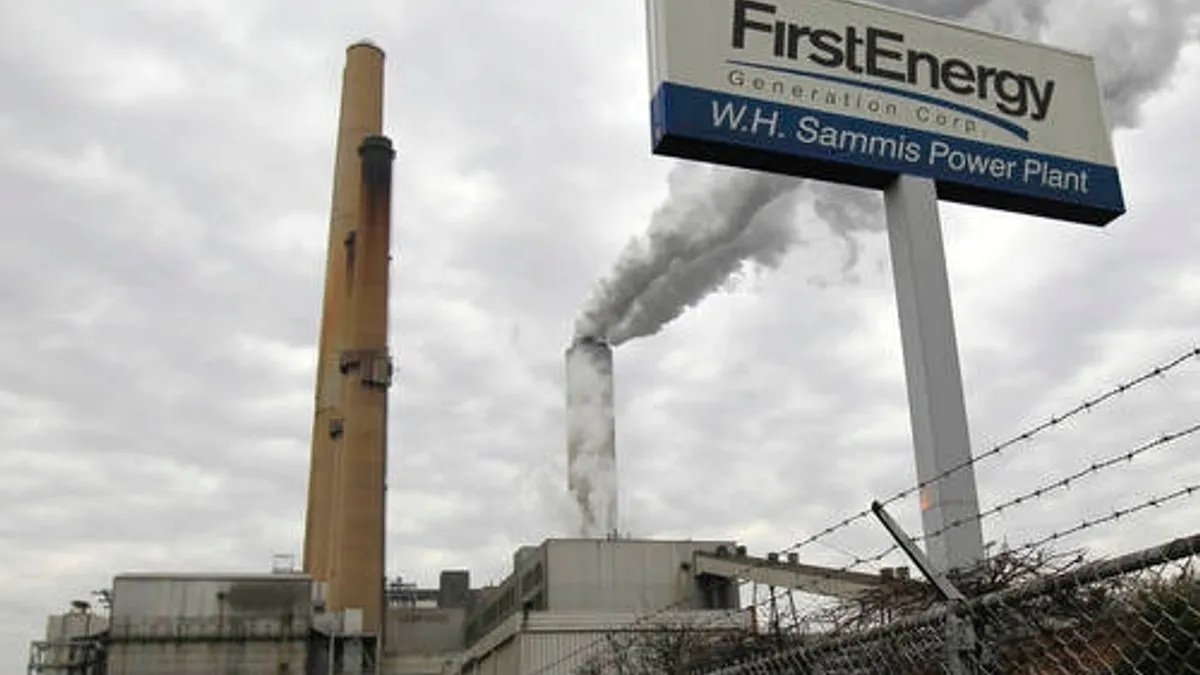Dive Brief:
- The Federal Energy Regulatory Commission (FERC) has blocked power purchase agreements approved by Ohio regulators last month to support aging coal and nuclear plants owned by FirstEnergy and AEP Ohio.
- In two orders issued late on Wednesday, FERC rescinded waivers it had granted to the two companies allowing them to purchase power from their affiliate generators. Without the waivers, the utility cannot purchase power under the approved PPAs without a FERC review.
- The PPAs will now be subject to FERC's affiliate abuse test, RTO Insider reports, which directs companies to show evidence of either head-to-head competition, other unaffiliated buyers willing to pay similar prices for the same generation, or unaffiliated generators that have made sales at similar prices.
Dive Insight:
Under FERC rules, utilities with captive customers cannot buy wholesale electricity from affiliated generators without the agency first conducting a review under the Federal Power Act to ensure the prices are fair to consumers. The aim is to ensure regulated utilities that also own generation fleets do not use their market power to hike prices for ratepayers.
FERC's affiliate abuse review, referred to as the Edgar test, compels utilities to prove they are not misusing the affiliate relationship by showing examples of competition or prices that non-affiliated buyers are willing to pay, the agency wrote in its decisions yesterday.
Now that FERC has rescinded generation waivers for AEP Ohio and FirstEnergy, their PPAs approved by Ohio regulators last month will now be subject to that test. That may not bode well for the companies, RTO Insider reports, as the plant subsidies are not subject to market competition and critics say they could cost consumers billions.
The PPAs in question guarantee income for seven coal plants and one nuclear plant owned by AEP and FirstEnergy that were uncompetitive in interstate electricity markets. While the companies argued the plants are needed to ensure reliability and hedge against potential price increases in fuel for natural gas plants, critics labeled the eight-year PPAs as bailouts for aging, inefficient generation.
In January, months before the Ohio decision, a group of rival generators filed with FERC, asking the agency to rescind power purchase waivers for what it labeled as a serious case of affiliate abuse—"a holding company that siphons funds from a franchised public utility to support its failing market-regulated power sales affiliate," according to the filing.
AEP and FirstEnergy entreated the agency to stay out of the case, arguing that since Ohio electricity customers can choose their retail electric providers, they are not captive customers, therefore eliminating the concern of affiliate abuse. But FERC agreed with the critics, ruling that the consumers are captive because they cannot avoid charges associated with the PPAs by switching providers.
"The Affiliate PPA raises the potential for cross-subsidization from AEP Ohio’s retail customers – who are captive in the sense that they cannot avoid the non-bypassable charge – to AEP Ohio’s market-regulated power sales affiliate, AEP Generation," FERC wrote, using similar language to its FirstEnergy decision. "While the Ohio Commission may have analyzed the effect of the PPA riders on retail customers, only this Commission can exercise jurisdiction to review the Affiliate PPA."
The Electric Power Supply Association, a trade group for generators and one of the petitioners against AEP and FirstEnergy, said in a statement yesterday that it is reviewing the decision.
"This means if AEP and [FirstEnergy] elect to proceed with the wholesale contracts, they will need to file the PPAs under section 205 of the Federal Power Act and show among other things that the deals they negotiated with themselves satisfy FERC’s rules designed to protect against such affiliate abuse," EPSA wrote in an email to Utility Dive. "That will have to occur in a new separate proceeding."
Dynegy, a rival generator and another petitioner, expressed satisfaction with the FERC decision. Dynegy's CEO has been a vocal critic of the PPAs and offered a natural gas alternative to the coal and nuclear subsidies.
"FERC agreed that customers are indeed captive to the out-of-market and exorbitantly priced PPA proposals that were accepted by the Public Utilities Commission of Ohio (PUCO), and has now ensured a transparent and thorough review for the benefit of Ohio residents and businesses," Dynegy wrote.
FirstEnergy spokesperson Doug Colafella told RTO Insider that while the company was disappointed with the ruling, it believes the PPAs satisfy FERC rules.
"Our affiliate FirstEnergy Solutions was previously granted authorization to conduct transactions with our Ohio utilities in 2008, and the PPA will benefit our customers by protecting them against rising retail prices and volatility in future years," he told the outlet. "FirstEnergy is evaluating its options, which include seeking rehearing of FERC’s order, as well as filing the PPA for FERC’s review. It’s always been our position that the PPA will satisfy the FERC’s criteria for an affiliate contract.”
AEP CEO Nick Akins reacted with frustration to the decision on an earnings call Thursday, Columbus Business First reports, saying he has "no interest in getting involved in a protracted FERC jurisdictional debate." The company will take a two-pronged approach by attempting to sell all its Ohio plants and pushing for re-regulation of the energy markets in Ohio, according to Akins. While the company could challenge the FERC ruling, Akins told investors "that's probably a longer hurdle at this point."






















